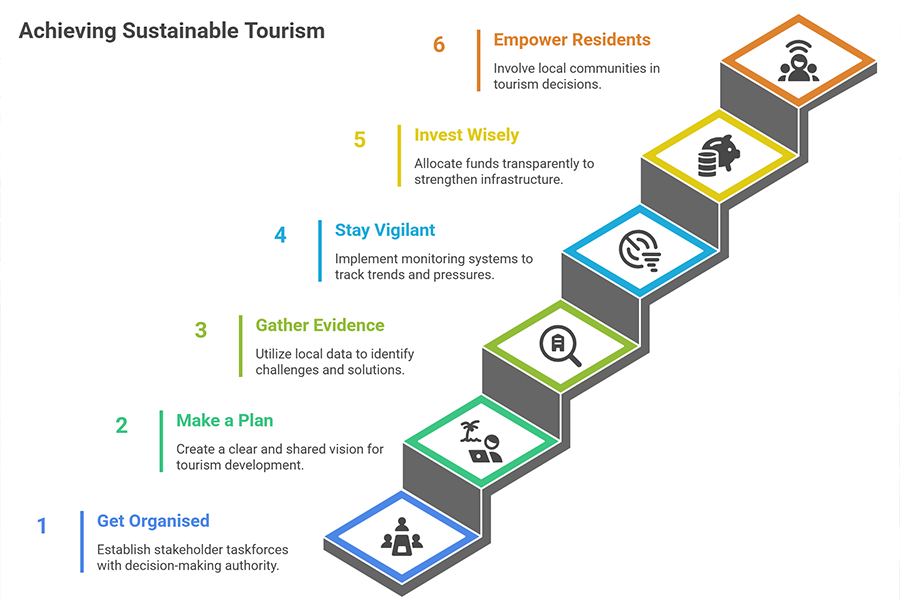World Travel & Tourism Council’s Masterstroke Six-Step Strategy to Combat Destination Overcrowding
Published : 16-Jul-2025 02:24:27 PM
The World Travel & Tourism Council (WTTC) has released a comprehensive report addressing the growing pressure on major tourist destinations worldwide, calling for a balanced approach to sustainable tourism management and urging governments to adopt coordinated long-term planning strategies. The report highlights critical challenges facing popular destinations, including destination overcrowding, underinvestment in infrastructure, poor planning, fragmented decision-making, and limited coordination between stakeholders. These issues significantly impact both visitors and residents, creating unsustainable conditions that threaten the long-term viability of tourism-dependent communities.
According to the WTTC findings, the global travel and tourism sector is projected to contribute nearly $11 trillion to the world economy in 2024, supporting 357 million jobs. Governments are expected to collect more than $3.3 trillion in tax revenue from tourism-related businesses, accounting for approximately 10% of total global income tax. The council emphasizes that governments must reinvest a portion of these revenues into infrastructure and community services to manage visitor demand sustainably.
Six-Step Tourism Strategy for Smarter Tourism Management
The WTTC tourism management plan outlines a comprehensive six-step framework for addressing destination management challenges:

- Get Organized: Establish stakeholder task forces with decision-making authority to ensure coordinated responses to tourism pressures.
- Make a Plan: Create a clear and shared vision for tourism development that aligns with community needs and environmental capacity.
- Gather the Evidence: Utilize local data to identify specific challenges and develop targeted solutions for each destination.
- Stay Vigilant: Implement proactive monitoring systems to track trends and respond early to signs of pressure before issues escalate.
- Invest Wisely: Allocate funds transparently to strengthen infrastructure and build resilience against tourism-related pressures.
- Empower Residents: Involve local communities in tourism-related decisions to ensure sustainable tourism practices benefit all stakeholders.
The WTTC report warns against implementing short-term initiatives such as visitor limits and tourism taxes, arguing these measures can lead to significant economic loss without addressing root causes. The organization cites examples from 11 major European cities that imposed tourist limits, resulting in a combined loss of $245 billion in GDP and nearly 3 million jobs over three years. The report also showcases effective destination management examples, including Barcelona's public-private partnership model guided by sustainability goals, and Iceland's approach of directing tourism revenue toward environmental protection. These cases illustrate how effective planning and community engagement can foster sustainable tourism frameworks.
"Travel & Tourism brings huge benefits, including jobs, investment, and deeper cultural understanding. But growth needs to be managed carefully. We're encouraging all decision-makers to think ahead, work together, and focus on long-term benefits for residents and visitors alike. This isn't about stopping tourism, it's about making it work for everyone," stated Julia Simpson, WTTC President & CEO.
The Smarter Tourism Management 2025 initiative emphasizes that each destination must find its balance through long-term planning, data-driven policies, and local engagement. The WTTC stresses that transparent funding, proactive monitoring, and comprehensive stakeholder involvement are essential for ensuring tourism continues to support both economic growth and community well-being. The report concludes that sustainable tourism practices require a fundamental shift from reactive to proactive management, with infrastructure investment and community involvement serving as cornerstones for addressing destination overcrowding while maintaining the economic benefits of tourism.
This comprehensive approach represents a significant step forward in addressing the complex challenges facing popular tourist destinations, providing a roadmap for governments and local authorities to implement more effective and sustainable tourism management strategies.
Get in Touch
Have An Enquiry? Write To Us…
Related Packages
Information Links and Downloads

We Got Featured in the Media
Stay Connected for All Updates!
For the latest updates on Kailash Mansarovar Yatra, Adi Kailash Yatra
and other incredible travel destinations, make sure you’re following our channel

 WhatsApp
WhatsApp Instagram
Instagram













